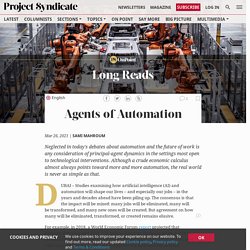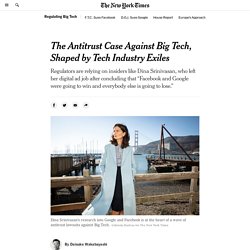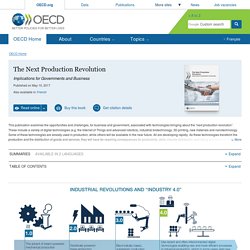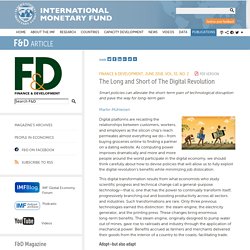

Agents of Automation by Sami Mahroum. Neglected in today's debates about automation and the future of work is any consideration of principal-agent dynamics in the settings most open to technological interventions.

Although a crude economic calculus almost always points toward more and more automation, the real world is never as simple as that. DUBAI – Studies examining how artificial intelligence (AI) and automation will shape our lives – and especially our jobs – in the years and decades ahead have been piling up. The consensus is that the impact will be mixed: many jobs will be eliminated, many will be transformed, and many new ones will be created.
But agreement on how many will be eliminated, transformed, or created remains elusive.
Blockchain & Data 61 Reports. The Antitrust Case Against Big Tech, Shaped by Tech Industry Exiles. “Who the heck consents to having a company track them across the internet,” she remembered thinking.

“They could only do it because they had monopoly power to do something that clearly goes against consumer interests.” After leaving the ad world in 2017, she spent the next year researching and writing a paper on why Facebook was a monopoly. When she was done, she submitted her paper to the websites of about a dozen law reviews. Facebook Is a Doomsday Machine. The Doomsday Machine was never supposed to exist.

It was meant to be a thought experiment that went like this: Imagine a device built with the sole purpose of destroying all human life. Now suppose that machine is buried deep underground, but connected to a computer, which is in turn hooked up to sensors in cities and towns across the United States. It’s Time to Break Up Facebook. America was built on the idea that power should not be concentrated in any one person, because we are all fallible. That’s why the founders created a system of checks and balances. They didn’t need to foresee the rise of Facebook to understand the threat that gargantuan companies would pose to democracy. New Zealand Is About to Test Long-Range Wireless Power Transmission. A famous image of inventor Nikola Tesla shows him casually sitting on a chair, legs crossed, taking notes—oblivious to the profusion of artificial lightning rending the air meters away.

By then, Tesla and raw electricity were like an old married couple. The experiments, conducted in Colorado, led to one of Tesla’s most audacious proposals: To power the world without wires. He made headlines with plans for a “world wireless system,” and won funding from JP Morgan to build the first of several huge transmission towers. But Tesla’s wireless energy dream died soon after. Innovation in Israel 2017 English. Exp f02 we are all intelligence officers now. Future Today Institute TechTrends Report 2018. The Next Production Revolution - Implications for Governments and Business - en. Launch event Within the framework of the 2017 Italian G7 Presidency, the Ministry of Economic Development organised the launch of the OECD’s Report “The Next Production Revolution: Implications for Governments and Business”.
“This publication examines the opportunities and challenges, for business and government, associated with technologies bringing about the “next production revolution”. These include a variety of digital technologies (e.g. the Internet of Things and advanced robotics), industrial biotechnology, 3D printing, new materials and nanotechnology. Some of these technologies are already used in production, while others will be available in the near future. All are developing rapidly. As these technologies transform the production and the distribution of goods and services, they will have far-reaching consequences for productivity, skills, income distribution, well-being and the environment. The more that governments and firms understand how production could develop in the near future, the better placed they will be to address the risks and reap the benefits.” – barbaragrieve
The Report was presented in Rome with the introduction of the Deputy Minister of Economic Development Teresa Bellanova, the participation of Gabriela Ramos, Chief of Staff and G20 Sherpa OECD, Raffaele Trombetta, Italy’s G7/G20 Sherpa, and Stefano Firpo, Director General for Industrial Policy of the Ministry of Economic Development.

Read more about the launch event New technology still under-used by businesses, says OECDBusinesses need to accelerate adoption of cutting-edge technologies, materials and processes if countries are to reap their full potential in terms of productivity gains, according to a new OECD report. Development and implementation are taking place mostly in large firms, and even then... Meet Dawn. Big Data Analytics Maturity Model - The Path to Data Value Creation.
0816 71 The regulator of 2030 publication Web FA FINAL. Challenges and opportunities in clean, green synthetic foods. Best of the Week New Zealand's chief scientist says synthetic foods pose a real threat to agricultural exporters, but better regulation of genetic modification could create an equally large opportunity.

Speaking to the NZBio Conference in Wellington, the Prime Minister's chief science advisor, Sir Peter Gluckman, said the main threat to New Zealand's economy was from synthetic milks, such as the yeast-based milk created by San Francisco company, Perfect Day. "I think if there is an existential risk for New Zealand, this is where it lies," he said. "The health claims that have been traditionally associated with 'natural milk' are not going to stand up ... against these kinds of claims" Existential Risks 2017 01 23. Strategic Foresight 3rd programme. The Dawn of the Singularity: A Visual Timeline of Ray Kurzweil's Predictions. EY Digitisation of everything. Muhleisen. The Impact of Digital Technology on Society and Economic Growth - IMF F&D Magazine - June 2018.
Finance & Development, June 2018, Vol. 55, No. 2 PDF version Smart policies can alleviate the short-term pain of technological disruption and pave the way for long-term gain Martin Mühleisen Digital platforms are recasting the relationships between customers, workers, and employers as the silicon chip’s reach permeates almost everything we do—from buying groceries online to finding a partner on a dating website.

As computing power improves dramatically and more and more people around the world participate in the digital economy, we should think carefully about how to devise policies that will allow us to fully exploit the digital revolution’s benefits while minimizing job dislocation. This digital transformation results from what economists who study scientific progress and technical change call a general-purpose technology—that is, one that has the power to continually transform itself, progressively branching out and boosting productivity across all sectors and industries.